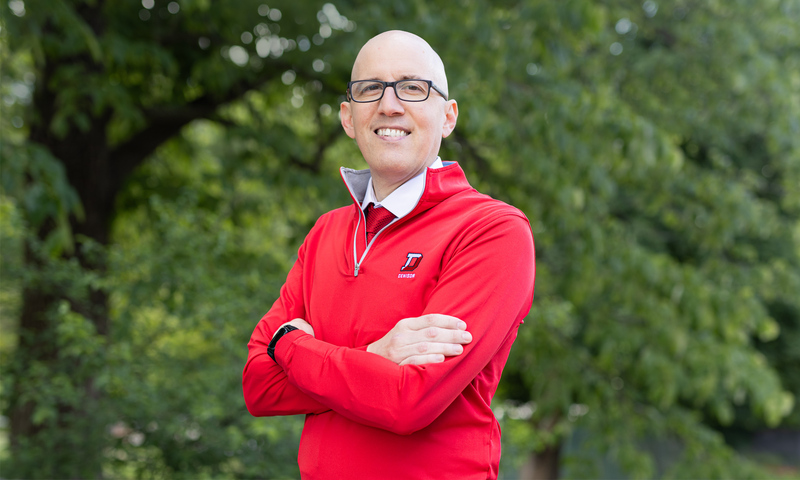Kirsten Fox, associate director for The Knowlton Center for Career Exploration, has provided five action items for seniors to take during their final months at Denison. Bonus: all students should consider these during their Denison career.
1. Break out of your comfort zone
Step out of your comfort zone and hold yourself accountable for doing something that will challenge your expectations, encourage responsibility and promote decision-making.
Involve yourself these last months in various experiences that are different from what you have spent the prior three years doing. Participate in a service-learning or senior capstone experience; join a cross-community dialogue; take part in a student organization that challenges your thoughts; find a winter break job, internship or externship; or go on an alternative spring break. You’ll grow with these experiences, and your employers will be impressed with your willingness to move and think outside the box.
2. Brand yourself by creating a professional presence on LinkedIn, while selectively posting on other social media sites.
Be mindful that recruiters and employers will look for you on all social media outlets. Focus your energy and attention on LinkedIn, a social networking site used for professional networking. LinkedIn has a great student resource site: https://students.linkedin.com. Move yourself from student to rising professional by creating a profile that associates you with the qualities and areas of expertise that align with the professional you want to become.
Connect with Denison alumni on LinkedIn in our special subgroups for Arts, Business & Finance, Communication, Health, Law, and Service & Education, six of the arenas Denison graduates frequently pursue. Reach out and ask if they might be willing to provide advice or tips for success in a certain field, location or position. Your LinkedIn profile is your live resume, and it should be your go-to social media outlet during your senior year.
Be consistent in your brand and strategic in what you put out in cyberspace. Remember that every tweet, status update, and Snapchat or Instagram picture contributes to your personal brand.
3. Network, network, network!
Tell everyone you know — faculty, classmates, even your roommate’s mom — about what you hope to do after graduation. Network with alumni on Denison’s alumni website, alumni.denison.edu. Think of strangers as potential professional contacts who you just haven’t been introduced to yet. If you are going home for winter break and your dad asks you to shovel the sidewalk, take this as an opportunity to say hello to passers-by. You never know which neighbor might have a cousin working at your dream company/school/etc.
4. Find and engage a professional mentor
Mentors can provide a wealth of resources, tips and professional networks that can be shared with students during both the job/graduate school search and the transition to post-college life. They also can provide a stabilizing force during this period of time that is often stressful and isolating. Mentors also can help you practice professionalism and understand professional etiquette in a no-pressure environment, while being realistic as to the expectations of employers and entry-level jobs.
To find a mentor, leverage the networks you have — professors, advisors, staff members, or supervisors. Ask for recommendations or connections to a mentor. You mentor need not be local; it’s 2014 and you can utilize technology like Facetime, Google Hangout, or Skype to maintain and strengthen your connection.
Plan regular meetings with your mentor and seek advice around career planning. Build your network and ask to be introduced to other contacts in the area of your professional interest. And remember, as important as it is to find and engage a mentor, it also is your responsibility to be a good mentee. Be open, honest, engaged, prompt and appreciative.
5. Be the best prepared job seeker/graduate school candidate
Work with The Knowlton Center for Career Exploration to learn how to effectively articulate the value of your educational experiences, both curricular and co-curricular. Employers don't want to hear a list of your accomplishments; they want to know how you learned and grew from your experiences. A career advisor can help you refine and customize your resume and cover letter to be geared toward specific opportunities. Complete a mock interview (or several) to hone and refine your interview skills. Attend workshops and events led by the career staff.
Remember, just as you are the architect of your education, you also are the architect of your future. Only you can reach out and use the resources available to take intentional action toward your goals. And also keep in mind that this is actually an exciting and fun, if stressful, time. You will meet people who potentially could be an important part of your life for many years to come.
So enjoy the process as much as you can, and you’ll find that it will help to relieve anxiety. A few years from now, when you look back on this time, you’ll understand why and how events took place and be able to appreciate all that you learned and the progress that you made.

